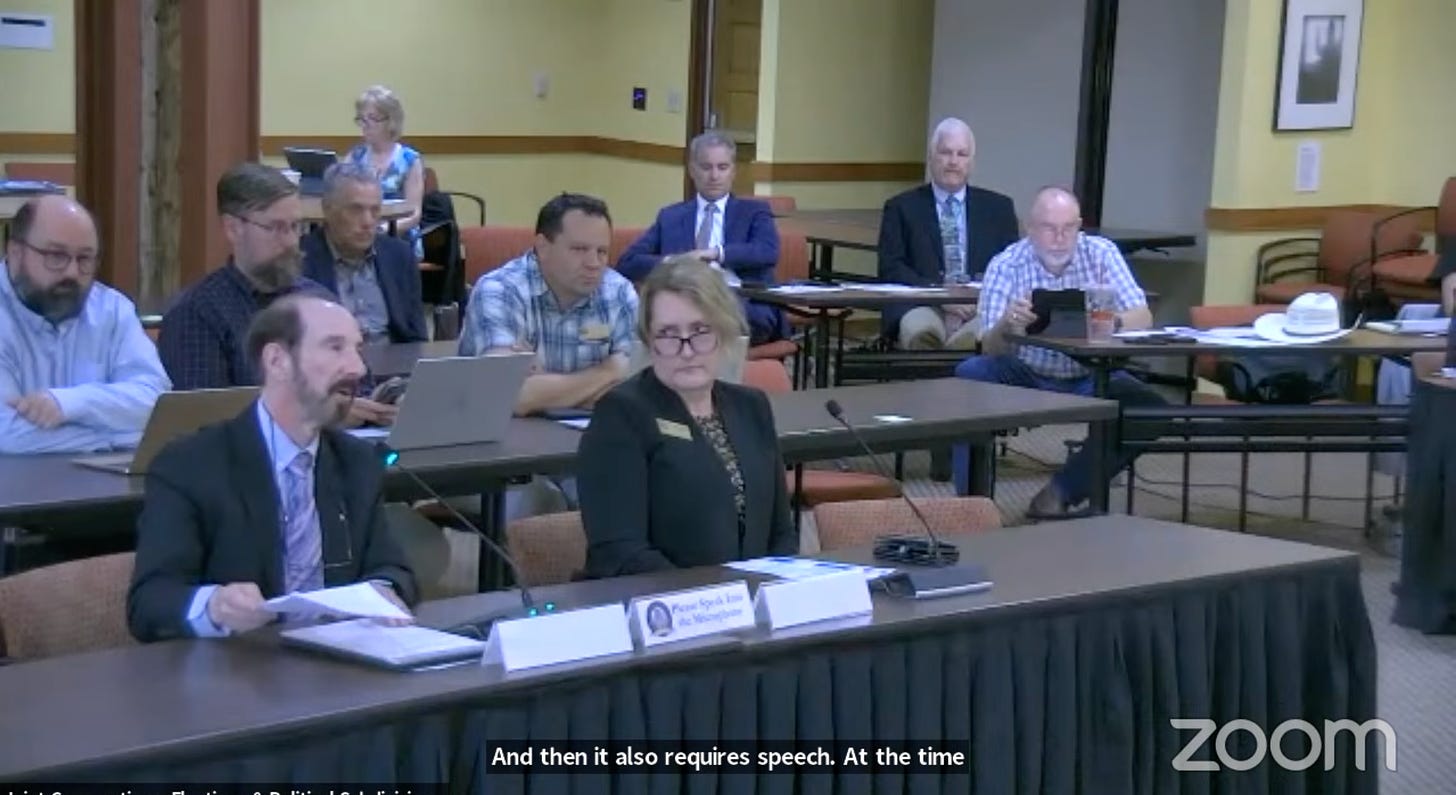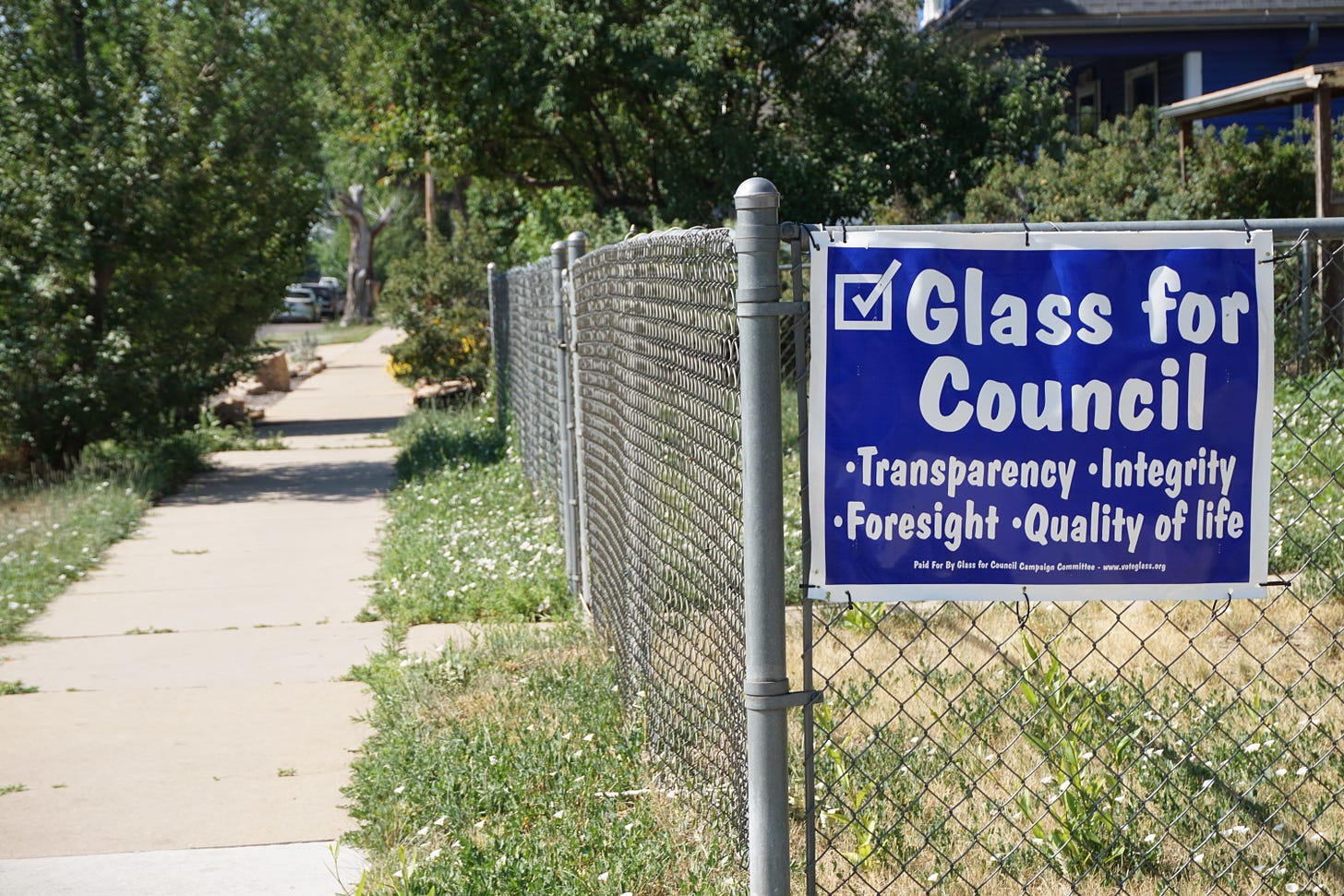Lawmakers ax bill seeking to outlaw Laramie's rental regs
The proposal would have reserved the power to regulate rentals to the state, ending Laramie’s rental housing code. Laramie residents dominated public testimony before the corporations committee.
Laramie’s rental regulations have survived another attempt to reverse them.
On Tuesday, the Wyoming Legislature’s Corporations, Elections & Political Subdivisions Committee heard testimony on a draft bill that would have preempted the entire field of rental regulations — meaning such regulations could only be set at the state level. The preemption bill, as it was sometimes called, would have effectively outlawed Laramie’s City Rental Housing Code and forbidden any community in Wyoming from passing its own.
But when the corporations committee took a vote to endorse the preemption bill, that vote failed on a 5-6 split — halting the proposal’s path from draft to legislation.
“That one’s properly killed,” Committee Chair Rep. Jared Olsen (HD-11) said, before amending his own comment. “Well, nothing’s ever completely killed in the Wyoming Legislature. It can always come back.”
That is perhaps especially true with this preemption bill, which was itself the resurrected form of a failed 2023 bill with the same aim.
This year’s bill was raised for the first time during an earlier corporations committee meeting in April and it was discussed again during a Regulatory Reduction Task Force meeting this month.
Laramie City Manager Janine Jordan made an appearance during the task force meeting, defending Laramie’s rental code and championing the right of communities across the state to establish their own. Jordan appeared before lawmakers again on Tuesday, offering public testimony at the corporations committee’s meeting in Evanston.
“These are minimum habitability standards — what is required to make your rental habitable by a human being in a safe fashion,” Jordan said. “These standards are so basic. They’re the basic that I would want, or I think you would want for yourself or your loved ones. Is there functioning plumbing? Is there heat? Is there fire escape from bedrooms? The standards are less onerous than what is contained within the International Residential Code.”
But some landlords have claimed the regulations are indeed onerous.
In 2022, Bell Leasing launched a lawsuit seeking to overturn the local rental housing code, though ultimately a district court judge ruled the city has a clear legal authority to establish such regulations.
During committee meetings this year — including Tuesday’s — Laramie landlord Brett Glass has turned out to support the preemption bill and to rail against his city’s rental code.
“The Laramie ordinance really hasn’t improved things for tenants or landlords, but what it has done is it’s really harmed the market,” he said. “Many landlords have just not registered, and just hoped that this would go away. Some of them have withdrawn their properties from the market. Some of the major landlords in town, some very good ones, have actually decided they’re going to liquidate their properties rather than going ahead and deal with all of the bureaucracy.”
The rental code outlines basic health and safety standards for rental units within city limits. These habitability standards require that units be structurally sound, weatherproofed and free of pests or mold. They also dictate that any major electrical, plumbing or heating work within the unit be performed by licensed professionals, and that bedrooms be outfitted with fire escape windows. They also mandate the installation of carbon monoxide detectors around carbon monoxide sources.
In addition to the habitability standards, the rental housing code requires landlords to register their rental properties with the city (a legal requirement a majority of Laramie landlords are violating) and pay a nominal fee (which works out to $1.67 per unit per month).
Jordan told lawmakers the paperwork required to register one’s units is negligible.
“You go online, you self-complete a checklist,” she said. “Is there heat? [Are] there functioning appliances? Is there a fuel-burning appliance? And if so, the International Building Code says you should have a carbon monoxide detector in that facility. So these aren't things that the council made up. They’re, in fact, derived from International Building Code. It takes about three minutes to complete that checklist and submit it to the city and pay $20 a year and you will receive your license.”
There is no inspection required for registering one’s property. The landlord must simply attest that their rental unit conforms to the habitability requirements.
Glass said requiring an attestation from the landlord infringes on their rights.
“It compels speech,” he said. “It requires the landlord … to affirm to the city that all sorts of specific things — a long checklist about the rental — have been satisfied.”

The only enforcement mechanism attached to the rental housing code is via a complaint system. Tenants who find themselves in rentals falling below the new standards can — after asking their landlord for a fix and allowing time for that fix to occur — lodge a complaint with the city manager’s office. City staff will then inspect to verify the claim, demand the landlord make whatever fix is required to bring the unit up to standard and can, should the landlord persist in refusing to make the fix, bring a criminal charge against the landlord.
At last count, the city had received 21 complaints in the roughly 18 months the rental code has been in force. Glass claimed, as he has before, that many of these complaints are trivial, dealing only with a landlord who has not registered their property.
“Some of them partially involve the landlord not filling out the city’s paperwork rather than actual problems,” he told lawmakers Tuesday. “Some of them do involve actual problems with the rentals, such as the heat not working, some of them with a plumbing problem, something like that. All of those are actionable under the state statute, and the state statute has better provisions for dealing with them.”
Glass has softened his characterization of the complaints since he last presented to lawmakers. At the Regulatory Reduction Task Force meeting two weeks ago, he said, “the majority of those complaints had nothing to do with the actual rental issue, but rather, the landlord failing to fill out all the city’s bureaucratic paperwork.”
Between that meeting and the more recent corporations committee meeting, Glass filed a public records request for those complaints.
Jordan referenced that request during her own testimony, saying it was enlightening to prepare those records because it reminded her of the “dire circumstances that some people are forced into because of their income.”
“We’ve received 21 complaints; Mr. Glass likes to liken those as a paper-pushing issue, but I will assure you they are not,” Jordan told lawmakers. “The most frequent complaints that we have received [are] from tenants who are complaining about absent or malfunctioning heating, plumbing, electrical and smoke detectors.”

Jordan said city staff and councilors were consistently hearing from residents who were unable to get these issues addressed under existing state law. Before the establishment of Laramie’s City Rental Housing Code, tenants could only force an unscrupulous landlord to fix their heating by taking that landlord to court.
As nonprofit organizations have highlighted, there is a severe power differential between landlords and tenants, such that tenants face structural disadvantages in the courtroom if they can even afford to file the paperwork and get there.
“It is true that under a civil contract, they can pursue a remedy through the court,” Jordan said. “But most of our renters cannot afford to do that.”
There’s also nothing stopping a landlord from evicting tenants who complain long before any court matter can play out.
Jordan argued the city adopted rental regulations as an answer to this problem, giving tenants a less onerous and more accessible complaint system that can mandate remedies faster and more reliably than the legal system could.
She also stressed the uniqueness of Laramie as a city of renters.
“In Laramie, 55% of our housing units are occupied by renters — more than half,” Jordan said. “Laramie has 7,560 rented housing units. That’s more than the city of Casper, which is twice our size, and slightly less than the city of Cheyenne. One in 10 of Wyoming’s renters actually lives within the municipal boundary of Laramie.”
While many renters are college students, the demographics of Laramie’s tenant population are not as simple as many assume.
“36% of our renters have a bachelor’s degree or higher,” Jordan said. “25%, or one in four, are married couples. And 25% of our renters are 34-plus. Again, these are not students. These are workers.”
While much of the debate surrounding this bill focused on Laramie — the only community in Wyoming to have passed such an ordinance — the bill itself would have limited all communities across Wyoming from establishing a rental housing code, forbidding every city, town and county from following Laramie’s lead.
Lawmakers said they were hesitant to do this.
“My heartburn just rests with the fact that we have this penchant lately to expand the authority of state government every time we turn around,” Sen. Bill Landen (SD-27) said. “This isn’t a landlord vs. a tenant thing. This is: ‘Do we really want state government rolling in in a bigger fashion?’ … I trust our local officials to address the issues that are unique to their cities and towns.”





What I found in most communities is that the City Council is controlled by representatives of Finance, Insurance and Real Estate. In Laramie that is not the case and that is a good thing as those governments do not represent the people but their benefactors.
What I find interesting is the lack of discussion about the power of the insurance industry to force landlords to do what is right by their tenets. I was an insurance inspector for a time until I got tired of being the "dick of Wyoming" by telling business owners/landlords that were going to lose their insurance if they did not fix the issues I identified during the inspection.
For instance there is no law that prevents wood burning fireplaces in homes or businesses but almost every property that had one of these existing units would be either get rid of the fireplace or pay a hefty premium to keep one. There were also show stoppers associated with electrical systems, functioning smoke detectors and many other requirements designed to prevent payouts on poorly located or maintained properties.
It seems pretty clear to me that the insurance industry will place far more burdens with far greater leverage than the city ordinance, but complying with these requirements may help reduce the landlord's insurance costs.
And maybe that is what the City Council should do is contact the major property insurers and see if the landlords could get an insurance break if the landlord registered their properties and complied with basic requirements that the city asks for?
As usual, blogger Jeff Victor has cherry picked portions of my testimony before the Committee rather than linking to the actual source material. For full, unredacted video of the discussion, see https://youtu.be/c8Dx_8TH5W8?t=5886.
In the disucussion before the Committee, citizens were outnumbered by bureaucrats, who made a number of very misleading statements. There was also behind-the-scenes lobbying by WAM (the Wyoming Association of Municipalities), which constantly lobbies for more power for municipal governments.
In any event, the bill was eventually voted down. What the legislators who voted against it said - loudly and clearly - is that they believe very strongly in the concept of "local control." As they remarked to me after the vote, they will gladly give us enough rope to hang ourselves. If we in Laramie want to strangle our local economy, harm business development, make housing unaffordable and unavailable, or create an overbearing, overreaching bureaucracy, they will let us do that and learn from our mistakes.
And we are already starting to learn.
Rentals are already in short supply, and rents are already skyrocketing. Tenants are discovering (as shown by public records) that even if they complain to the City about a problem with a rental, they still must go to Small Claims Court (which costs only $10) or Circuit Court (a whopping $35, but it can do more for you) to enforce their rights. Fortunately for them, that's easier to do than to deal with the City.
One of my goals should I be elected to Council (despite Jeff's efforts to campaign against me in this blog) will be to increase the supply of workforce and affordable housing without compromising on quality, safety., or enforcement of tenants' rights. As a landlord, a tenant, AND a longtime resident of Laramie who wants to see it prosper, I see this as vital to our community's future.